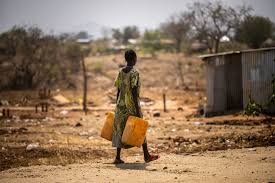As the world grapples with the ever-intensifying impacts of climate change, Africa stands at a critical juncture, facing both challenges and opportunities in adapting to a rapidly changing climate. One of the most pressing issues is the increase in frequency and severity of extreme weather events; from prolonged droughts to devastating floods. Current climate models are showing projections of trends indicating higher likelihoods of extreme weather events with each coming year.

Particularly drought poses a significant threat to the Agricultural sector in Africa mostly because it’s rain-fed farming. The fact that erratic rainfall patterns and prolonged dry spells are becoming more common in different regions of Africa, crop yields are also expected to decline. Ultimately, causing food insecurity and economic hardship for millions of African people. It cannot be layed out enough that governments and international organizations must come up with immediate strategies to improve: water management, promote drought resistant agriculture and enhance adaptation capacity among all vulnerable communities.
The sudden rise in rainfall intensity due to the climate crisis has predisposed particularly the East African region to flash floods and landslides. This has exacerbated environmental degradation and disrupted essential services such as transportation and health care; leaving women and children in more jeopardy. Sadly, loss of life and property to climate change is becoming the African footprint. We agree that collective efforts are needed by all stakeholders from governments to civil society to improve drainage systems , invest in climate risk analysis and education on early warning systems. This could mitigate impacts of flooding plus enhance disaster preparedness in our vulnerable communities.
The ongoing key weather event has been of already high atmospheric temperatures continuing to rise. In South Sudan it has led to indefinite closure of schools, due to a heatwave of 41-45°C expected to last for 2 weeks. Then parents have been advised to keep their children mostly indoors, watch out for signs of heat strokes and heat exhaustion. Even with current day evidence of climate change that is dittering our daily lives, its disappointing that sometimes some individuals in the world consider climate change a joke and demand for more proof. This all comes at an expense of the lives of the African people. The increment in temperatures also assists in the spread of heat related illnesses like: malaria and dengue fever, posing a significant threat to public health. Uganda is one of the countries grappling with the malaria burden but climate change simply makes it worse. Hence there must be intentional research in health risks associated with climate change for purposes of public awareness and empowerment of health systems for climate related events.
Regardless, it’s paramount that Africa thrives even in a changing climate error. This complex picture of the climate crisis can also be a chance to explore green potentials on the African continent including: abundant renewable energy, climate smart agriculture, green technologies, protect critical habitats, restore degraded land and set new economic opportunities. This could definitely help us adapt to several climate related issues and alleviate poverty rates in Africa. These visions, if put into action will automatically transform the continent from a vulnerable population to a ground of limitless potentials.
